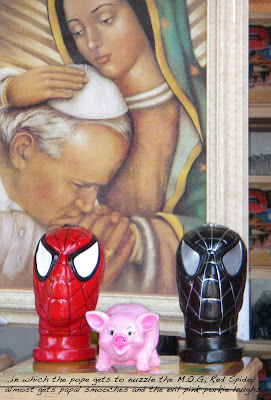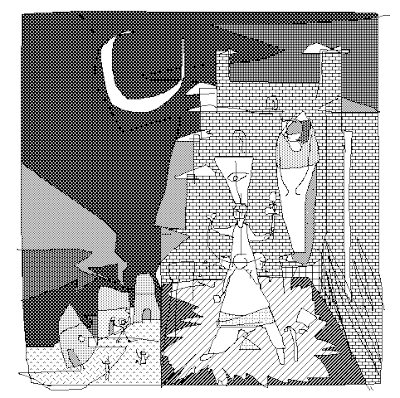PORT TOWNSEND, WASHINGTON, USA, 2006—Our local newspaper conducts a poll. This is the question: “How should we respond to the problem of homelessness in Jefferson County?”
A quarter of the people think that we should “urge the creation of affordable housing.” However, only 2% favor subsidized rent. This is in a county where many working persons search for two, three or four low-wage jobs to pay the rent. This is at a time when the minimum wage in our country is $5.15 per hour. Twenty-five percent of the working families in the United States of America don’t earn enough to rent a two-bedroom apartment.
This American small-town paper suggests the choice of allowing tent cities in public parks. Less than 6% of the citizens like that idea. We know about the tent city that Seattle has had for years. It began secretly in the woods in the middle of the city. Those people have been moved around constantly, ever since the city cracked down and bulldozed the encampment. The latest site is a clean and quiet church parking lot—surrounded by a worried neighborhood—in the suburbs.
There’s another option for us: crack down on illegal camps and prosecute offenders. Seattle has responded to people with nowhere to go. They’ve passed a law against sitting on the sidewalk. Another recent proposal there is to cut down the trees and remove the benches in public parks. Apparently the parks won’t be so attractive (to the homeless) then. New York City responds, as well. The homeless move on when prodded by police or they face arrest. How an unemployed, destitute, homeless person who has been prosecuted is supposed to pay the fine remains a mystery. A quarter of our home town’s survey respondents are all for “cracking down.” Just like the big cities, we would love to kick homeless people out. Let them go to the next neighborhood, the next town, city, county or state.
No word on how the individuals, the families, the elderly and the children we throw out will travel. Where they will go is not our concern.
Nobody seems to know who these people are—these people with no homes and no money, these people we want to fine.
Elaine was one of them, once. She quit her job and moved in order to be with her daughter who, pregnant with twins, was in a car accident. Elaine’s sister kindly opened her home to Elaine and her three children until Elaine could find work. Because of the car accident, Elaine’s daughter gave birth 12 weeks early to twin girls. Less than three weeks later, with those two babies still fighting for their lives, her sister’s house burned down. They were, all of them, suddenly homeless.
Carol had been out of work for three years and was still looking for a job, any job, when her unemployment compensation ran out. Katherine, a stranger, helped Casrol out until she found work. Then Katherine’s employer (perhaps the largest retailer in the world) fired her because of her disability (in violation of the Americans with Disabilities Act, incidentally).
Elsewhere in the land, Madeline, her husband and their five children found out the hard way that a water pipe under their house had been leaking. They suddenly got an unbelievable water bill from the City of Baltimore. They fixed the pipe and paid extra on their utility bill for months. That wasn’t good enough. The city sent them a notice that the land under their paid-off home would be seized and sold at auction for the balance they still owed: $310.09.
These folks are the lucky ones. With a little help from family, friends and strangers; with perseverance and hard work, in time, they’ve all got back to living from one paycheck to the next. The thing is, this can happen to anyone.
Elaine and Carol and Katherine and Madeline were not homeless. They have faced houselessness. Jessica, on the other hand, was homeless at age 20. She was completely alone in Union Square in New York City, with nothing but a few clothes and a tin cup. Someone cared enough to give her shelter for five days, until she could get herself into a place to live and a new, self-sufficient life. Jessica collected $2.68 in her tin cup on that day. She used it to help another stranger, a mother of three children, pay her rent.
I’ve been houseless in the past. I have not yet been homeless. Houselessness is not something to be feared, however awful you may think that would be for you. Like poverty, being without a place to live is just another obstacle. Sure, it can be overwhelming. When you are poor in America, everything is a struggle. If you have to give blood to get gas money to look for work, to make enough to go somewhere and apply for a “permanent job,” you are afraid of failure. When you wonder whether you’ll run out of gas at the end of the day and end up at the side of the road, with no way to even get back to your temporary “home,” you know fear.
But that is not the meaning of “homelessness.” Homeless means that you have nobody to turn to. It means that you have not only no shelter, but that you have no community, no family, not a single person in the world who will take you in. This very real fear rules the lives of many Americans today.
A survey conducted recently by Woman’s Day Magazine asks, “If you were laid off from work today, what could you afford to buy?” The overwhelming response, at 68% across the land, is this: “A pack of tissues to sob into.”
So what about that survey in our town? Here is the overwhelming, number-one response. The question: “How should we respond to the problem of homelessness in Jefferson County? Our answer: Focus on social programs that deal with mental health and substance abuse.”
Well, such programs may be a good idea for all of us. There are crazy people on our streets and drug addicts in our parks. Just as there are crazy people and drug addicts in our towns, cities, suburbs, offices and, yes, even in our capitol. But I thought the question was about homelessness. Call me crazy.
This essay originally appeared in Spring Hill Review, June 2005.












